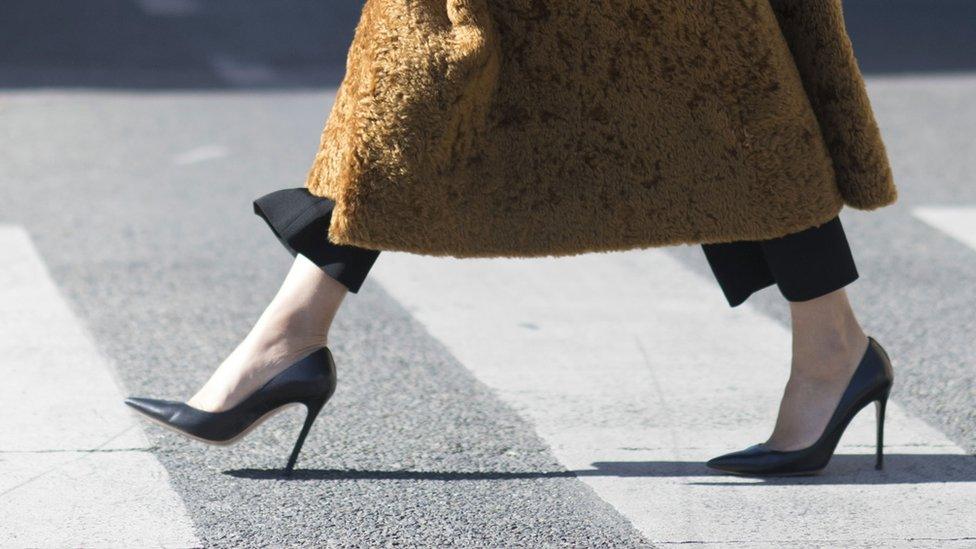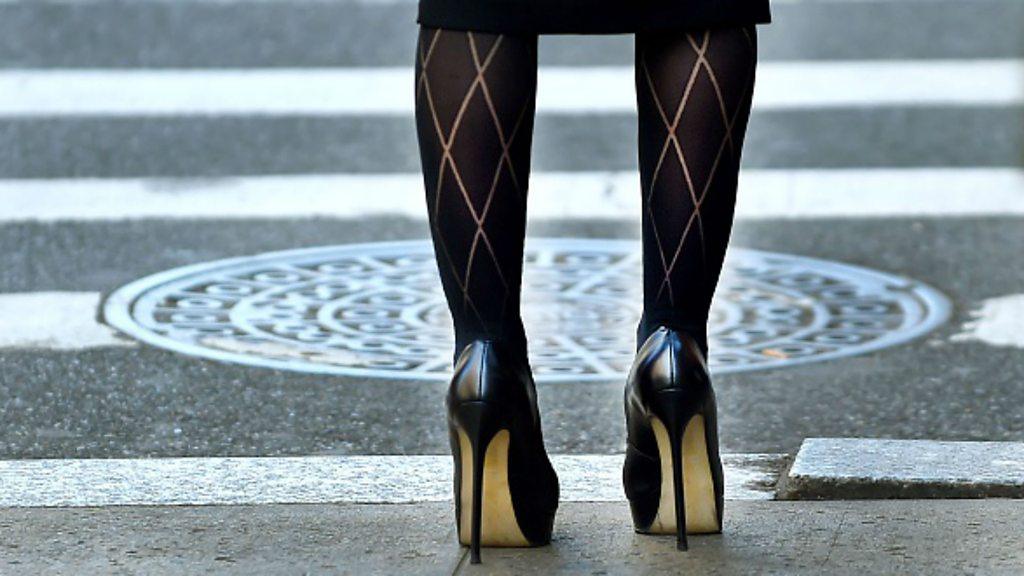Fine firms for sexist dress rules, say MPs
- Published
- comments
Nicola Thorp said she was laughed at for asking if male colleagues were also expected to wear heels
The government must enforce the law to ban sexist dress rules at work that discriminate against women, MPs say.
Their report, external follows the experience of London receptionist Nicola Thorp, who was sent home from work in December 2015 for not wearing high heels.
Her parliamentary petition on the issue, external gained more than 150,000 signatures.
MPs also heard from women asked to wear shorter skirts and unbutton blouses, and of dress codes detailing nail varnish shade and hair root colour.
The joint report, High Heels and Workplace Dress Codes, comes from parliamentary committees for Petitions and for Women and Equalities.
It said the Equality Act 2010 should ban discriminatory dress rules at work, but in practice the law is not applied properly to protect workers of either gender.
Chair of the Petitions Committee, Helen Jones MP, said: "The way that Nicola Thorp was treated by her employer is against the law, but that didn't stop her being sent home from work without pay.
"It's clear from the stories we've heard from members of the public that Nicola's story is far from unique."
'Two to four inches'
Ms Thorp was sent home from her job at a London office of the big accountancy firm PwC.

Some women said dress codes put them off aspiring to progress in the company
She refused to obey the then rules of her employment agency, Portico, that she should wear shoes with heels that were between two and four inches high.
Ms Thorp argued that wearing them all day would be bad for her feet, and that her male colleagues were not asked to follow the same rules on their clothes.
"This may have started over a pair of high heels, but what it has revealed about discrimination in the UK workplace is vital, as demonstrated by the hundreds of women who came forward via the committees' online forum," Ms Thorp said.
"The current system favours the employer, and is failing employees."
Podiatrist, Emma Supple, tells radio 4's Today that gender shouldn't dictate your work wear
When the two committees looked into the issue, they were inundated with complaints from women who said they had been victimised by sexist rules about the sort of clothes they could wear at work, with examples extending much further than just shoes.
The original Portico dress code, now revised in the wake of the row, specified:
Reapplication of make-up and specifics on lipstick, blusher, mascara, eye-shadow and base
Nail varnish from a specific colour palette
The thickness of hosiery
No visible roots on dyed hair
The committee heard evidence from women including:
demands they should wear shorter skirts and unbutton blouses for male Christmas shoppers
harassment of women in retail and reception jobs
how flight attendants were pursued via social media by customers.
'Enforce the law'
The MPs report recommends a publicity campaign be launched to ensure that employers know their legal obligations, that workers know how they can complain effectively and sixth-formers know their rights.
But its key recommendation is that the existing law should be enforced more vigorously, with employment tribunals being given the power to apply bigger financial penalties.

The original dress code had rules on nail polish, rings and tattoos
Guilty employers should be required to pay compensation to every worker affected by their discriminatory rules.
"The Equality Act is clear in principle in setting out what constitutes discrimination in law," it said. "Nevertheless, discriminatory dress codes remain commonplace in some sectors of the economy.
"We call on the government to review this area of the law and to ask parliament to change it, if necessary, to make it more effective."
The committees heard expert evidence that requirements to wear high heeled shoes were damaging to women's health.
The College of Podiatry pointed out that high heels cause pain for a fifth of women within just 10 minutes. On average it said ill-fitting high heels are painful after 1 hour, 6 minutes and 48 seconds.
Such shoes can also be disabling if worn for a long time, the College warned.
Women said high heels impaired their performance and made them feel humiliated or sexualised. Some said they struggled to wear heels because of medical conditions including:
Multiple sclerosis
Cerebral palsy
Arthritis and osteoarthritis
Morton's neuroma - caused by foot bones pressing against nerves over time
Spinal deformities or other back problems
Flat feet, wide feet, small feet.
Portico, Ms Thorp's then employer, said: "We fully support the recommendations within the report and welcome the debate in Parliament in March."
"When this issue was raised last year we immediately updated our uniform guidance."
A government spokesperson said: "No employer should discriminate against workers on grounds of gender - it is unacceptable and is against the law. Dress codes must be reasonable and include equivalent requirements for both men and women.
"The Government Equalities Office will carefully consider this report and will work with its partners to make sure employers comply with the law."
- Published25 January 2017

- Published23 June 2016

- Published12 May 2016

- Published12 May 2016
